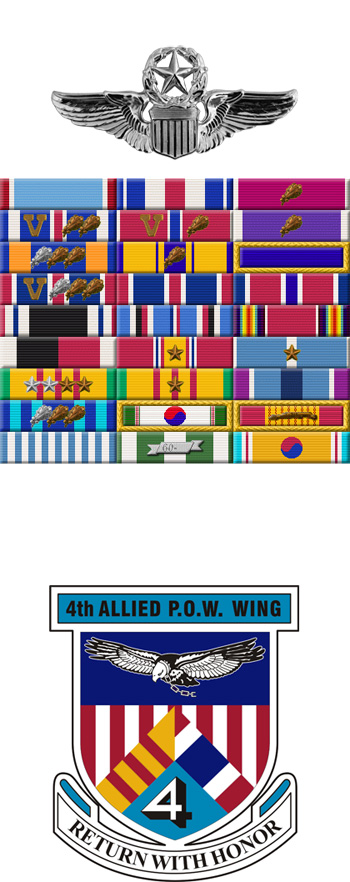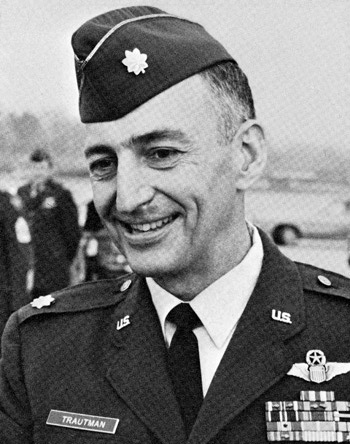
|
Konrad W. "Konnie" Trautman |
 |
|||
| Rank, Service | ||||
Colonel O-6, U.S. Air Force |
||||
| Veteran of: | ||||
|
||||
| Tribute: | ||||
Konnie Trautman was born on March 18, 1927, in Oberlin, Pennsylvania. He enlisted in the U.S. Army Reserve on March 18, 1944, and went on active duty in the U.S. Army Air Forces on June 20, 1945, serving as an Aerial Engineer on C-47 Skytrain transports until leaving active duty on November 20, 1946. PFC Trautman returned to active duty in the U.S. Army Air Forces on May 3, 1947, serving as a B-29 Superfortress gunner until leaving active duty on November 2, 1948, and then enlisted in the Aviation Cadet Program of the U.S. Air Force on March 23, 1949. He was commissioned a 2d Lt in the Air Force and awarded his pilot wings at Randolph AFB, Texas, on March 29, 1950, and then served as a P-47 Thunderbolt, F-84 Thunderjet, and F-86 Sabre pilot with the 86th Fighter-Bomber Wing at Neubiberg AB, West Germany, from July 1950 to July 1953. During this time, Lt Trautman deployed to Korea and flew 20 combat missions in the F-84 from August to October 1952. He left active duty on November 30, 1953, and then served with the Pennsylvania Air National Guard flying F-51 Mustangs from December 1, 1953, until he returned to active duty in the Air Force on August 1, 1955. Capt Trautman served as a Ferry Pilot with the 1737th Ferry Squadron at Dover AFB, Delaware, from August 1955 to February 1958, and then as Assistant Operations Officer for the 1912th Airborne Air Control Squadron at Olmstead AFB, Pennsylvania, from February 1958 to July 1959. His next assignment was as an Air Operations Officer, Plans Officer, and Chief of Plans & Programs for the 405th Fighter Wing at Clark AB in the Philippines from July 1959 to July 1961, followed by service as an Intercept Director with the 4627th Support Squadron at Custer AFS, Michigan, from July 1961 to August 1965. Maj Trautman served as a Weapons Controller with the 709th Air Control and Warning Squadron at Fort Yukon AFS, Alaska, from August 1965 to September 1966, and then attended F-105 Thunderchief Combat Crew Training from September 1966 to February 1967. He deployed to Southeast Asia in May 1967, serving as an F-105 pilot with the 13th Tactical Fighter Squadron at Korat Royal Thai AFB, Thailand, from June 1967 until he was forced to eject over North Vietnam and was taken as a Prisoner of War while flying his 62nd Combat Mission on October 5, 1967. After spending 1,988 days in captivity, Col Trautman was released during Operation Homecoming on March 14, 1973. He was briefly hospitalized to recover from his injuries at Andrews AFB, Maryland, and then received an Air Force Institute of Technology assignment to complete his bachelor's degree at Penn State University, followed by Air Command and Staff College at Maxwell AFB, Alabama. His final assignment was at Sheppard AFB, Texas, where he served as Assistant to the Center Commander, Deputy Commander of the 3785th Field Training Group, and Commander of the 3760th Technical Training Group from August 1976 until his retirement from the Air Force on December 1, 1981. Konnie Trautman Flew West on December 23, 2017, and was buried at Arlington National Cemetery. |
||||
|
||||

